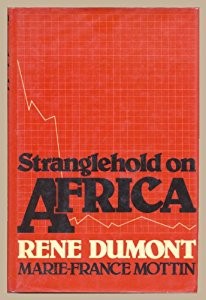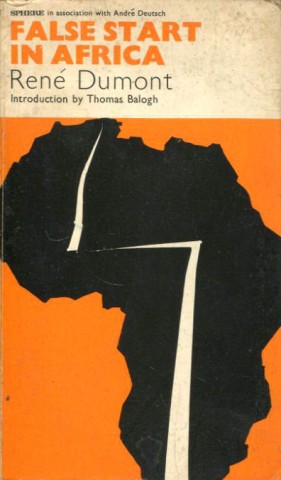In 1962 Rene Dumont wrote False Start in Africa, which offered unique perspectives for the time period, many of which continue to be relevant. I picked up "Stranglehold on Africa" by Rene Dumont and Marie-France Mottin (1983) hoping to find an equally interesting ideas. I did not find it as good as the earlier work. It is highly critical, but has far fewer positive examples (or reasonable recommendations), as the earlier work offered. One can sense Dumont's frustration.
The book would be a welcome source of quotes for those in opposition of international assistance: "It is development that has brought about the worst destruction in the history of the world, on an even more lunatic scale than during the two world wars" (p. xi); "Those who agree to wear the golden chains of aid are soon locked into a vicious circle of increasing dependence" (p. 20); "the looters in the West aren't going to give up without a fight – too many interests are at stake, and the economic machinery has been running smoothly for too long. They scarcely give a thought to the long term and to the future of our planet" (p. 248).
Further: "we urge our readers to remember that we, the developed nations, form the bulk of the privileged beings busily exploiting the planet. The prime responsibility for world famine therefore rests with us. We are the real hypocrites" (p. xii); "We must never forget the genocide perpetrated against the people of Africa, millions of whom were transported as slaves to the plantations of North America; or the wars of conquest that disseminated the slave economy and the system of trading valuable raw materials in exchange for the rejects of our own industrial production; or the colonial economies which were run solely in the interests of the parent state" (p. 1); "the European countries would like to present a picture of themselves as generous, and sympathetic to the interests of the nations they have exploited for so long and on such a large scale, and whom they are now starving. They hope in this way to wipe out the very memory of the original sins of capitalism and the Industrial Revolution, of slavery and colonization, but in fact they are merely repeating them" (p. 7).
The book is also self-critical: "Rereading the book in 1980 I realized that the historical and, more important, the sociological data on which it was based were inadequate. It gives off a strong whiff of Eurocentrism in its approach to the realities of life in Africa" (p. 2). Yet, it still offers critiques of all fields for a myriad of countries, and heavily remains a book about what "we" ought to be doing for "them".
Dumont offers some interesting comments about China, and its comparisons: "In China the peasants would have taken the initiative and dug the channels themselves, but then China, which receives no aid in the way of foodstuffs, relies first and foremost on its own resources" (p. 167). "Tanzania's peasant population haven't inherited the tradition of hard work familiar to their counterparts in China. Circumstances have never forced them into working hard, with the exception of the immigrant workers on the sisal plantations" (p. 168).
Rene Dumont's "False Start in Africa" (1962) is arguably one of the most influential and widely read texts on agriculture in Africa. The book is more of a conversation, than it is an academic text. However, Dumont was a pioneering voice for identifying key issues such as soil erosion, micronutrient deficiencies, soil type and quality in agricultural planning, (a degree of) participation and ownership, and of the value of local procurement. Readers might not come across many "new" ideas, but it is certainly worthwhile reading (if nothing else to see what was being said 55+ years ago in agricultural development).
Dumont recommends irrigation, fertilizer, erosion prevention, affordable energy and livestock as keys to agricultural development (p. 32). At the same time, he outlines many failures of large and inappropriate projects (in these same recommended areas). The book offers specifics as what Dumont feels is appropriate and worthwhile. The author suggests that machinery and equipment are essential - along with a reduction of luxury goods (p. 44) - but similarly outlines that the European model should not be blindly followed. Rather, a new path needs to be made by, and for, African nations (p. 58). In many ways, the book offers nuanced critiques and options for moving forward with positive examples (Dumont criticizes academics for their sole focus on failure, without recognizing success).
Given that the book was written in 1962, Dumont offers some unique perspectives. He says that "Economic progress requires an exodus from rural areas" (p. 195). He also calls for a radical shift in education - one more focused on technical skills, and not the copying of more academic oriented European models unsuitable to the needs of the nation (p. 202). Dumont promoted African and regional unity, economic unions, and continent-wide coordination (p. 264). He also argued that Europeans should not dictate to Africa (note that the author was a former colonial employee), and says "before giving lessons on socialism to Africa, let us set our own houses in order" (p. 280).
Amidst these interesting discussions, Dumont also offers his fair share of derogatory comments and bad ideas. For example, agricultural credit, he argues, should be given out by the local peasant leader to 'reinforce his authority' (p. 213). That authority, however, can act to entrench marginalization and exploitation. Although the language has changed, Dumont appears to favor the 'developmental state' model of a single party state to push development forward - at the expense of broad and inclusive participation (p. 240). While it is worthwhile recognizing the useful ideas of this book, we should also criticize it (as it is indeed well worth criticism).
From one perspective, Dumont appears to contradict himself in different parts of the text. However, as mentioned above, the book reads more like a conversation than a structured flow of ideas. So, irrigation infrastructure failures are pointed out, alongside broad opposition to large projects of this nature, while irrigation is also recommended. In my reading, these are general critiques with specific exceptions, rather than contradictions. Another example of this is land tenure. Dumont argues that tenure security is key (p. 128) but also that the land should be communally or state owned, and land should be taken from farmers in some instances (p. 129). While apparently contradictory, it appears that the general rule advocated is tenure security while revoking that security is the exception. Others more versed in Dumont's opinions, or the rest of his works, may have a better understanding - it is nonetheless worth noting for potential readers that the book is one more akin to hearing stories and getting advice from an experienced grandfather, than it is a systematic research work with clearly stated positions / recommendations.
As a side note: Amongst his advice, Dumont recommends African students to read Frantz Fanon (p. 251).


